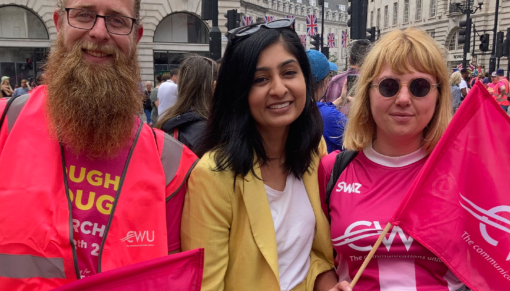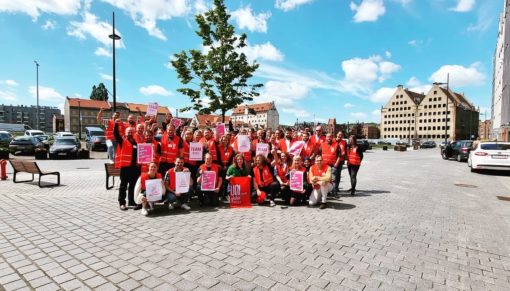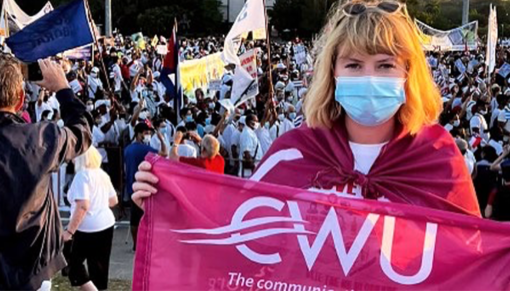UNI Europa Youth Conference 2022 – Gdansk – #Backtoourfuture
July 1 2022This summer the CWU National Young Workers Committee sent two delegates to the UNI Europa Youth Conference in Gdansk Poland. 64 participants attended, representing 33 trade unions, from 17 countries, with a 43% quota of women. The conference was the first since the pandemic, with many issues to discuss that disproportionately affect young workers that have been further exacerbated by Covid-19. We found the challenges young workers face across Europe to be sadly similar, namely, precarious work, low wages, inequality, low representation in trade unions, automation, digitalisation and environmentalism. Throughout the conference the delegation reviewed and approved the proposed UNI Europa Youth Action Plan for the next two years, which is an agenda to improve the working conditions of young workers through unionisation.
The UNI Europa Youth Action Plan for 2022-2024:
- Rebuilding Youth
- Organising Youth
- Democracy, Equality, Equity, Diversity, Inclusion and Youth Participation
- Skills and Training
- Collective Bargaining
We listened to a guest speaker in support of each of the action plans and delegates were also given the opportunity to speak. The trade union experience and knowledge shared, provided the delegation with pragmatic ideas to take back to their own workplaces, unions and countries. We also voted for the new steering committee to direct UNI Europa Youth in implementing the action plan over the next two years, as well as enacted an emergency motion on Ukraine.
Special Guest Speaker – Henryka Krzywonos – Solidarity Movement
During the conference we were fortunate enough to be addressed by Henryka Krzywonos, a social activist, politician and leader of the general strike in Gdansk in 1980. Henryka told us about the series of strikes and protests that started in the city in the early 80s through a culmination of political unrest, low wages and the cost of living. At the age of 26, Henryka was a tram driver who stopped the tram she was driving which started a transport strike in the city. This then led to the legendary shipyard strike, the start of the Solidarity movement and the Gdansk Agreement. Henryka told us how she spoke up in the workplace about the grievances the workers felt but could not express themselves for fear of losing their job. She admitted that she had once also stayed silent, due to the responsibility of caring for her sister, but when her sister married, Henryka felt she had the freedom to commit herself to the cause and became the voice of the workers.
However, in 1981 the polish communist party passed the Martial Law which prohibited the Solidarity movement from organising and led to the arrests of trade unionists and activists affiliated with the movement. Henryka herself was beaten by the authorities which led to her losing her unborn child and forced her to go into hiding in the countryside. Nevertheless, she continued with her activism underground by producing political leaflets with the help of her comrades who came to stay with her in tents on the farmland where she lived. In 1983 the Martial Law was lifted and Henryka was able to return to Gdansk where she got a job in a hotel and began to rebuild her life in the city. Later she met her husband and went on to adopt twelve children due to being unable to conceive herself, following the assault from the polish military. Nonetheless, she continues to be politically active and prides herself on being a working class, social activist, as opposed to a politician. Henryka believes trade unionists must feel democracy in their hearts and shouldn’t be in politics for the status of a position. She also advised the delegation to be honest and transparent in their activism, as well as trusting and respectful of each other, irrespective of age. Henryka Keyzwonos’ speech about her lived experiences was incredibly moving, not only from a trade unionist perspective, but also from a working-class woman’s point of view.
European Postal and Telecom Trade Unions
We were delighted to meet fellow postal and telecom trade unionists from other countries at the conference in Gdansk. FSC-CCOO are a Spanish trade union that represent postal workers in Spain who are currently going through industrial action, due to the threat of the dismantlement of their public postal model. A three-day general strike and protests took place in the main provincial capitals of Spain in early June, with 20,000 postal workers marching in Madrid alone. As well as FSC-CCOO, we also met delegates from the Swedish trade union, SEKO, who represent telecommunications and postal workers. In the photograph below, the delegation in Gdansk can be seen showing their solidarity with the postal workers of Spain, as well as with postal and telecom workers in the UK and our disputes over pay.
The Museum of the Polish Post in Gdansk
I travelled to Gdansk with some understanding of the more recent political and industrial history relating to the shipyard strike and its influence on the fall of the wall. However, I was surprised to learn about the cities postal service history and the events during the second world war. During the period between 1920-1939, Gdansk was a free city under the custody of the League of Nations. The Constitution of the Free City of Gdansk guaranteed Poland the right to possess and run post, telephone and telegram services in its territory. However, in 1939 the administration of the Polish Post became fearful of a Nazi attack, so they trained the postal workers to use weapons and they became known as the ‘Defenders of the Post’.
The administrations fears were realised when the Nazi’s attacked the post office on September 1st, 1939. The same day as the ‘Battle of Westerplatte’ in Gdansk, which marked the start of the second world war. The raid on the post office took place at 4.45am, simultaneously with the attack on Westerplatte. There were 55 postal workers in the building at the time of the attack, armed with three machine guns, a dozen rifles and a few pistols and hand grenades. The Defenders of the Post were able to fight off the Nazis for 14hours, before surrendering at 7pm. The surviving 38 postal workers were then arrested and sentenced to death by firing squad. The whereabouts of the defender’s bodies was unknown until 1991 until the mass grave was located. The bodies were then buried in the Cemetery of the Nazi Victims in Zaspa and a monument for the postal workers killed was erected in the location of the mass grave.
Reflecting on Gdansk
The UNI Europa Youth Conference is a unique experience for a young trade unionist to learn and share practices to engage and unionise young workers. I would encourage Branch Secretaries across the CWU to motivate young members into the Young Worker Officer position in their branch, so that they might have the opportunity to attend similar events, learn from other young trade unionists and secure the future of the trade union movement. The city of Gdansk has a strong industrial history, all those interested in political history, socialism and the mobilisation of the working class should endeavour to visit.








